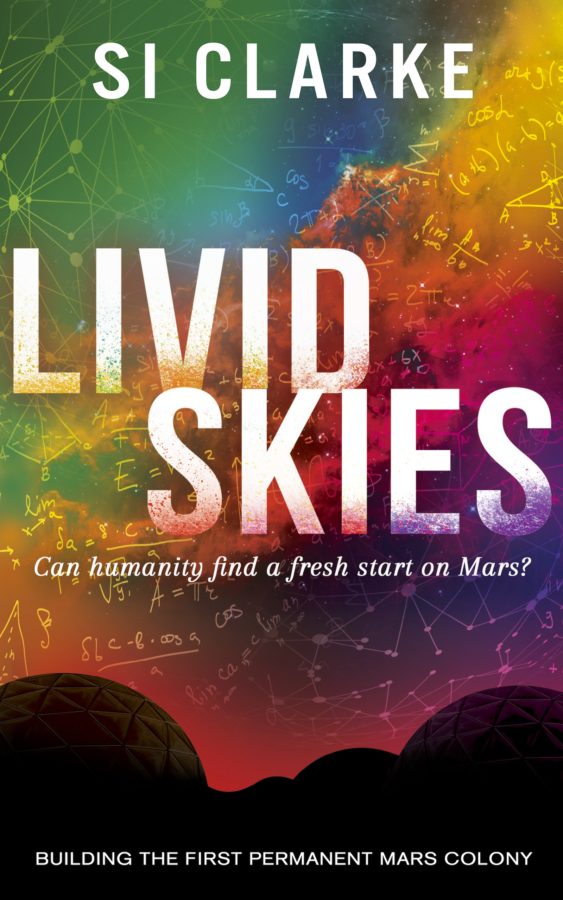Genre: Sci-Fi
Reviewer: Scott
Get It On Amazon
About The Book
A fresh start, a queer social liberal dream, and a planet that wants to kill you.
Noble aspirations are easier said than done, though – especially when the entire planet wants to kill you. Grappling with the realities of human nature and with their batteries slowly dying, the colony’s 150 women and 10 men must overcome their differences to create a lasting community.
But things aren’t always what they seem and maybe the colonists aren’t as alone as they thought…
Perfect for fans of Mary Robinette Kowal’s ‘Lady Astronaut’ series and the writing styles of Robert J. Sawyer and Becky Chambers. This thought-provoking sci-fi novel blends classic science fiction ideas with neurodiverse and LGBTQIA+ themes.
The Review
I have to admit, I’ve long admired the covers of SI Clarke’s “Devon Island” series. I knew they were set on Mars and featured a diverse cast of characters, but little did I realize how much I would enjoy spending time in her world. At the author’s suggestion, I started with book two – Livid Skies. I’ve always assumed “livid” meant a strong, bright color… like a livid purple bruise. Right? I was wrong. As one character explains in the book:
‘The colour, I mean. The sky. It comes from the Latin word lividus, meaning a dull leaden-blue colour.’
And yes, the spelling in the book is British, as is the author. As are a number of the characters. Another aspect of the story I loved.
Getting back to that story – book one, Devon Island, dealt with planning and launching the mission, and the arrival of the advance crew on Mars to prepare the colony site.
Book two picks up with the colonists en-route, months earlier than initially planned, due to a much deadlier pandemic than our current one. It’s a plague that has killed half of Earth’s population
and scrambled everything.
If you’re reluctant about reading a “pandemic book” at the moment, don’t be – it just serves as the distant backdrop to the main story.
The advance team is frantically trying to get the new colony – the eponymous title of book one, Devon Island – ready for the colonists’ arrival, and there’s still a ton of work to do. There are new domes to be built, power supplies to bring online, and crops to plant.
I had just one quibble with this book – all the characters are in first person. It’s really not a big deal, as the POV changes are segregated by chapter, and the voices are strong and unique. But I did have to refer back to the chapter header a few times, when I put the book down in mid chapter and came back to it a few hours later.
I discussed this with SI, and she explained that she prefers first person because it removes the need for a lot of gender identifiers, at least for the narrating character, which makes sense, and you get used to it.
Livid Skies is vast in ambition and scope, and covers about eight Earth years (four “mears – I adore that word). It follows the colony’s growth, through additions by birth (and from one surprising source) and subtractions by death. Several tragedies punctuate the story, serving to goose the action and remind us of the danger all around the intrepid colonists.
The book asks some fundamental questions:
- How close can you hew to your ideals when something terrible happens to challenge them?
- Who deserves forgiveness and redemption?
- What would you keep and what would you discard if you could reboot human society from scratch?
The answers to that last one (and the practical ramifications) are often fascinating and unexpected.
I love colony stories, watching while the characters literally build a new world. Livid Skies excels here too. Clark did her homework – if you want proof, check the excellent afterword that digs deep into the science behind Devon Island, from power to recycled waste.
The book has a bit of an episodic feel to it – it’s a snapshots-in-time narrative that carries us through the opening years of the nascent colony. But the story doesn’t suffer for that – quite the opposite. It kept me up a few nights, well past my bedtime, to find out what happened next.
I also really loved the matter-of-fact diversity here – of race, sexuality, gender, culture, religion and nationality. But these characters aren’t token cardboard cutouts. They’re fleshed out, fascinating people with conflicting needs and desires, navigating a difficult and claustrophobic situation while dealing with the issues of everyday life. Like running out of chocolate and coffee.
Thanks to Clarke for giving me a bit of hope and a wholly encompassing escape from the scary “real world” for a few days – I am in awe of Clarke’s easy skill and ability to plunk me down in the middle of her world and make me care.
This one’s gonna stick with me for a long time, and that’s a high compliment.
The Reviewer
Scott is the founder of Queer Sci Fi, and a fantasy and sci fi writer in his own right, with more than 30 published short stories, novellas and novels to his credit, including two trilogies.


